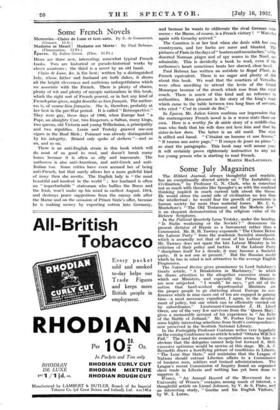Some July Magazines
The Ribbert Journal, always thoughtful and readable, has an exceptionally shrewd article on " The Instability of Civilization," by Professor G. N. Clark, who is concerned not so much with theories like Spengler's as with the confused thinking implicit in much current talk about the theme. He would stress the social side of civilization no less than the intellectual ; he would fear the growth of pessimism in human society far more than material losses. Mr. C. G. Montefiore's ` The Old Testament and the Modern Jew " is an eloquent demonstration of the religious value of the Hebrew Scriptures. In the Political Quarterly Leon Trotsky, under the heading, " Is Stalin weakening or the Soviets ? " denounces the present dictator of Russia as a bureaucrat rather than a Communist. Mr. R. H. Tawney expounds " The Choice Before the Labour Party " from the academic Socialist standpoint, which is assuredly not that of most of his Labour friends. Mr. Tawney does not spare the late Labour Ministry in his criticism of their policy and tactics. If the Labour Party " disciplines itself for a decade, it may become a Socialist party. It is not one at present." But the Russian model which he has in mind is not attractive to the average English Progressive. The National Review gives prominence to Lord Salisbury's timely article, " A Breakdown in Machinery," in which he draws attention to the altogether excessive strain to which our Ministers, and especially the Prime Minister, are now subjected. " I would, he says, " get rid of the notion that hard-worked departmental Ministers are the proper people to go clattering about Europe to con- ferences which in nine cases out of ten are engaged in gaining trine—a most necessary expedient, I agree, in the develop- ment of policy, but one which can be efficiently carried out by subordinates." Lieutenant-Commander J. H. Lloyd Owen, one of the very few survivors from the ' Queen Mary,' gives a memorable account of his experience in " An Echo of the Battle of Jutland." Mr. W. Forbes Gray has made some highly interesting selections from Scott's correspondence, now preserved in the Scottish National Library. In the Fortnightly Professor Coatman writes very hopefully on the coming Conference in an article headed "Ottawa Will Not Fail." The need for economic co-operation seems to him so obvious that the delegates cannot help but forward it. Still, excessive optimism would be unwise at this stage. Mr. A. J. Reynolds draws a horrifying picture of conditions in Liberia, " The Lone Star State," and maintains that the League of Nations should entrust Liberian affairs to a Commission of business men, soldiers and trained administrators. The League's recent Commission of Inquiry found an organized slave trade in Liberia and nothing has yet been done to suppress it. Wessex, " An Annual Record of the Movement for a University of Wessex," contains, among much of interest, a thoughtful article on Lionel Johnson, by V. de S. Pinto, and an interesting study, " Goethe and his English Visitors," by W. I. Lucas,


































 Previous page
Previous page